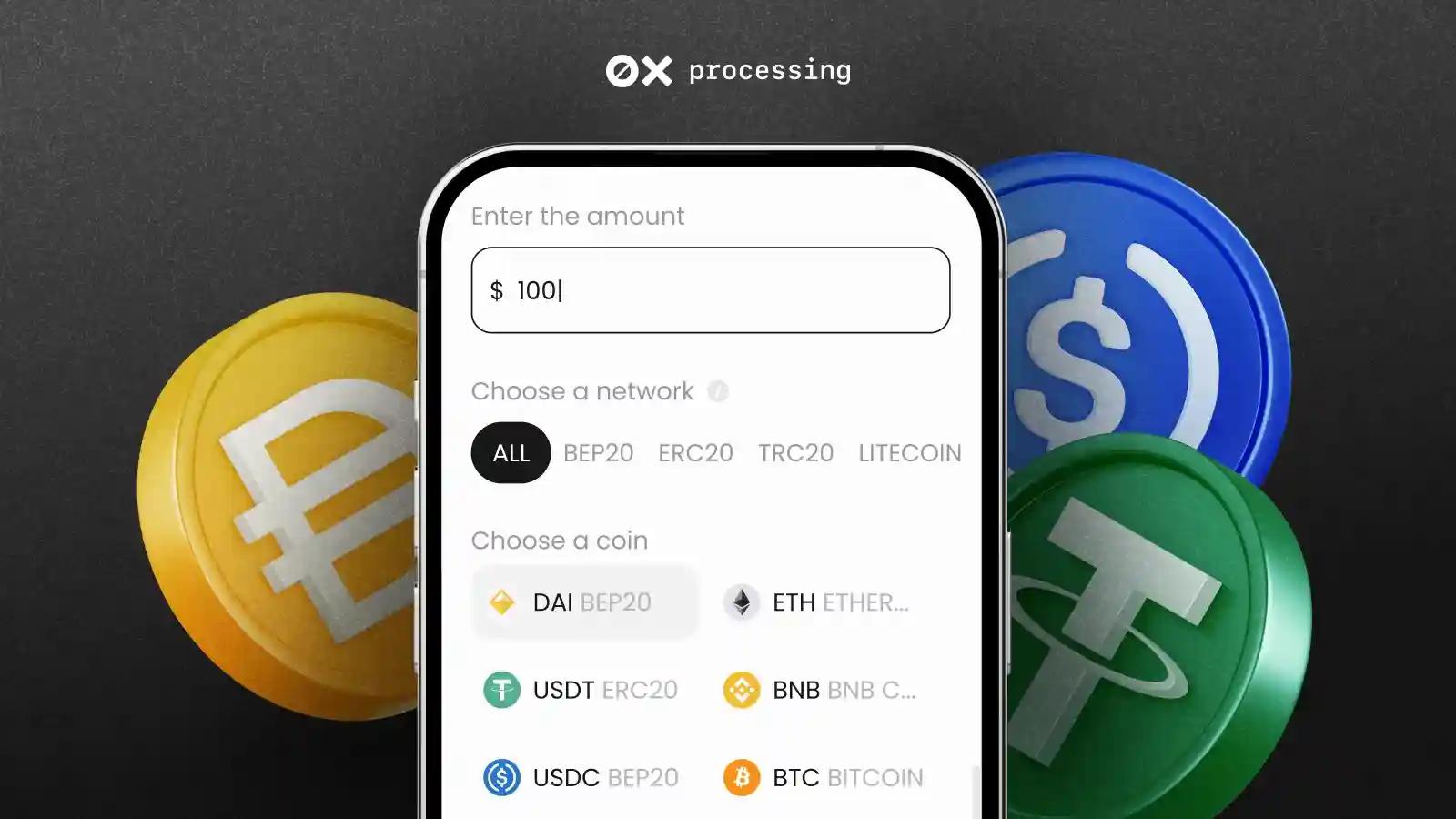In the modern digital world, the concept of money is evolving increasingly. Cryptocurrencies have become what triggers changes in traditional financial systems and transactions. In light of this digital revolution, businesses strive to stay up-to-date, thus making the acceptance of cryptocurrencies as a payment method more and more significant. In this article, we will discuss crypto processing and its importance for modern businesses. We will examine the key principles, benefits, and features of crypto processing, as well as pave the way for analysing innovative technologies related to this process.
What is crypto processing?
Crypto processing, also known as cryptocurrency acquiring or crypto acquiring, is the process of merchants accepting digital currencies such as Bitcoin, Ethereum, or others as a form of payment for goods or services. It involves integrating the necessary platforms, such as payment gateways or processors, to ensure secure and smooth cryptocurrency transactions. This allows companies to expand their customer base and increase revenue by servicing a wider range of customers who prefer to use cryptocurrencies, as well as those who have lost the ability to pay through traditional methods. Cryptocurrency can be traded for fiat money, which refers to traditional currencies such as rubles, dollars, euros, etc. Without crypto acquiring, the merchant is forced to manually convert the cost of the goods into the selected cryptocurrency by the user, send their wallet address for payment on the required network, verify payment information, and confirm the payment.
However, because of the little information about crypto-processing, people are thinking about bank card processing.
The difference between bank card processing from crypto processing:
Bank card processing and crypto processing have several differences. Here are some of them.
- Native currency. When processing bank cards, local currency is usually used, as it is tied to bank accounts. Crypto processing can involve cryptocurrencies such as Bitcoin or Ethereum.
- Security technologies. Bank cards typically use PCI DSS security standards to protect payment data. Crypto processing usually relies on blockchain technology and cryptography to ensure transaction security.
- Centralization/decentralisation. Bank processing is usually centralised, with banks and payment systems controlling transactions. Crypto processing, on the other hand, can be decentralised, involving multiple network nodes.
- Transfer. Crypto processing often focuses on providing transparency and traceability of transactions through the use of blockchain technology. All transactions are available for review, which helps to build trust and protect against transaction risk. In bank processing, transaction information can only be accessed by participants who have appropriate access rights.
In contrast, transparency in bank processing depends on the policies of each bank. These differences highlight the unique characteristics of bank processing and crypto processing, each of which has its advantages and disadvantages depending on the specific situation.
However, crypto processing is now one of the safest and most reliable ways to conduct electronic payments, and here's why it's better than traditional credit card processing:
Advantages of crypto processing
Security. Cryptoprocessing utilises powerful cryptographic algorithms to protect information and encrypt data. This makes it much more secure than credit card processing, which is still vulnerable to various forms of fraud, such as data theft from magnetic stripe cards and card counterfeiting.
Global Accessibility. Crypto Processing enables payments to be made anywhere in the world using different cryptocurrencies and digital assets. Users can send and receive payments online with minimal delay and fees. This makes crypto processing convenient and accessible for everyone, regardless of their location.
Efficiency. Unlike credit card processing, which requires involvement from a third party (a bank), crypto processing can work directly between the sender and receiver of the payment. This significantly increases payment processing speed and reduces fees.
Transparency. Crypto Processing operates on blockchain technology, which provides transparency and reliability for transactions. All transactions are recorded on a distributed ledger that is accessible to all network participants. This makes crypto processing more reliable and supports benefits such as payment tracking and fraud prevention.
Innovation. Cryptoprocessing represents a new generation of technologies that are actively evolving and improving. Its capabilities expand with the emergence of new cryptocurrencies and digital assets, as well as the development of smart contract technologies. Therefore, crypto processing promises to be the future standard for electronic payments.
Overall, crypto processing is a more secure, efficient, and innovative way of processing payments compared to credit card processing. It offers users greater protection, better accessibility, and attractive opportunities for utilising digital assets.
Cryptoprocessing is a set of technologies and methods that allow payments to be processed using cryptographic methods to protect information. However, there are disadvantages that also need to be known in advance.
Disadvantages of crypto processing
High cost. Implementing and maintaining a crypto processing system can be costly. Companies have to invest in the necessary technical resources and personnel training to ensure proper system functioning.
Integration complexity. Integrating crypto processing can be a complex process, especially for companies with existing complex payment systems. Integration may require significant effort and time to ensure compatibility with other systems.
Dependence on the internet. Crypto processing requires constant internet connectivity for transaction processing. If the connection is interrupted or slow, delays or errors in payment processing may occur.
Security risks. While crypto processing is designed to enhance payment security, it can also be subject to security risks. System vulnerabilities or external attacks can lead to the compromise of customer confidential data or money theft.
Limitations in payment system choices. In some cases, crypto processing works only with specific payment systems or service providers. This can limit companies' choices for solutions and create inconveniences for customers who prefer to use other payment systems.
Technical complexities The cryptographic methods used in cryptographic processing can be difficult to understand and implement. Companies may face issues related to system configuration and updates, which may require an information security specialist or programmer.
Overall, cryptographic processing has its drawbacks, but it remains popular due to its ability to provide security and confidentiality in online payments. Companies must weigh the pros and cons before deciding whether to implement this system.
To make it easier to analyse the pros and cons of crypto processing, we have visualised it in a table.
Comparing crypto processing’s advantages and crypto processing’s disadvantages in the table:
| Advantages: | Disadvantages: |
|---|---|
| Anonymity | High volatility of the exchange rate |
| Security | Limited spread of cryptocurrency use |
| Speed of transfers | Limited support for payment systems and cryptocurrency assets |
| Reduced moderation requirements | Difficulty of integration with existing payment systems |
| Global accessibility - cryptocurrency | Risks of hacking and cyberattacks |
| Lower fees compared to traditional payment systems | Limited ability to refund payments and process disputes (Chargeback) |
| Use of secure cryptographic protocols to protect data and transactions | The need to comply with additional rules and regulations related to cryptocurrency transactions. |
| Ability to make micropayments and payments with no amount limits | Technical issues related to unreliability or failures of cryptocurrency networks |
| Simplification of the payment process for clients using cryptocurrency wallets | Difficulty in converting cryptocurrency into traditional currencies for further use |
| Enable transparent and traceable transactions using blockchain technology | |
| Potential for innovation in financial services and development of new business models |
After considering all the pros and cons in the table, we can understand how important it is to use crypto processing in particular.
Methods of crypto processing
Crypto Processing can be done with or without a cryptoprocessor. A cryptoprocessor is a specialised hardware module that performs cryptographic operations such as encryption, decryption, key generation and signature verification. The cryptoprocessor is usually built directly into the microchip or processor, and operates independently of the operating system and software. The cryptoprocessor provides a high degree of security and enables fast processing of cryptographic operations.
However, crypto processing can be done through a cryptocurrency gateway. A cryptocurrency gateway is a tool that enables the processing of cryptocurrency transactions and the acceptance of cryptocurrency payments. It provides security and data encryption and can also provide other functionality related to crypto payment processing, such as currency conversion, automatic generation of addresses for accepting payments, etc. Crypto gateways are often used by online shops and other businesses that accept cryptocurrency payments. One example of a cryptocurrency gateway is 0xProcessing.
Benefits of using 0xProcessing to process cryptocurrencies.
0xProcessing emerges as a specialized crypto-processing gateway, prioritizing secure transactions. The team behind the gateway has innovatively developed technology solutions that eliminate reliance on third parties, ensuring highly reliable transactions and protecting against the loss of both funds and data. 0xProcessing provides its merchants with one of the most extensive catalogues of available cryptocurrencies (more than 50 cryptocurrencies). 0xProcessing makes it possible to receive crypto as payment from customers all over the world, without any restrictions.
Advantages of using 0xProcessing:
-
Simplicity of connection. The process of adaptation is very fast, only account creation, quick integration and start accepting payments are required.
-
Protection from volatility. 0x implements its own technology of volatility protection – VRCS (volatility risk control system). Automatic conversion to stablecoins provides volatility protection for your assets.
-
Security. Using proprietary blockchain infrastructure for payment processing provides a high level of security and helps avoid unnecessary risks.
-
Adaptability. 0x offers the ability to customize the form of payment according to the merchant's brandbook (White Label). The simple and easy to understand form interface ensures high conversion rates to payment.
-
Support. Merchants 0x have access to a personal manager and 24/7 support from technical experts.
-
Web 3.0. 0x provides an opportunity to receive fast, safe and convenient payments using web3-wallets.
How to connect the cryptoprocessor?
After comparing the advantages and disadvantages of cryptoprocessors, many people have a question about its connectivity. Let's look at the example of 0x.
Here are the steps to connect to 0xProcessing:
-
Go through the KYB procedure. This is necessary for safe connection and further work. 0x allocates merchant personal managers to accompany you on this step to ensure that everything goes quickly and efficiently
-
Integrate the service using APIs. 0x personal manager and technical expert will be with you during the integration phase and will help you understand its details. Integrate the service and receive crypto payments
In conclusion, the rise of cryptocurrencies and the concept of crypto processing is revolutionising the traditional financial systems and transactions. Businesses are recognizing the importance of accepting cryptocurrencies as a payment method to stay up-to-date and expand their customer base. Crypto processing, or cryptocurrency acquiring, allows merchants to securely accept digital currencies as payment and even convert them into traditional fiat money if needed. The differences between bank card processing and crypto processing highlight the unique advantages of each. However, crypto processing is emerging as a safer and more reliable way to conduct electronic payments. It offers enhanced security through cryptographic algorithms, global accessibility, efficiency in payment processing, and lower fees. As the digital revolution continues, the adoption of crypto processing is becoming increasingly significant for modern businesses.

